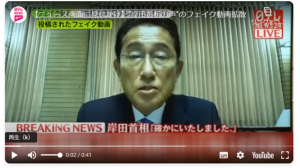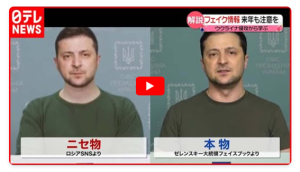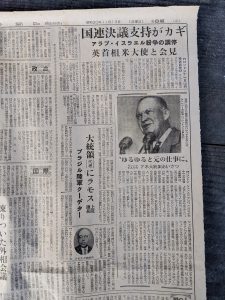続報!え~まさか!危うく国際的詐欺の被害者に?「偽ニュース」にご用心!
続報!え~まさか!危うく国際的詐欺の被害者に?「偽ニュース」にご用心!

夏頃、私が自分の不注意で危うく国際的な振り込み詐欺事件の被害者になる?
とのブログを書きましたが、その後関連情報があったので追加します。
まず、国内の民放キー局が「偽動画」について注意を呼びかけました。
内容は「生成AI」を使って実在のアナウンサーの声や動きを再現したとみられる、
ニュース番組に似せた「偽の広告の動画」が10月下旬からYouTubeや
フェイスブックなどSNSで広がっています。

こうした、偽動画は投資情報サイトへの登録を促す内容で、本来の番組とは
関係ない動画なので、信用しないように!」と、注意を呼びかけています。
確かに、私はこのニュースではないですが、国際的な有名人が出演する
ニュース番組風のサイト動画を見てついつい、そのサイトにアクセスしました。
そして、フォームに登録、危うく大トラブルに?なりかけました。汗
また、この局の注意で気になるのは「偽動画は、数字の読み方やイントネーションに
不審な点があるけれど、生成AIを使って実在の人物が話しているかのような動画
が作成されている。
最近では表情や口元の動きが声と合っていて違和感がないものも
増えてきている」と指摘している点です。
「今後、偽物と見破るのが難しくなるという懸念も出ています。」と!
私もテレビ局でディレクターをしていたので、
その動画に少し違和感があったものの、全体的な構成、編集に問題はないし、
有名人が強くアピールしているのでちょっと信用してしまいました。
私は現在でも、個人的にも最新の動画編集ソフトを使っていますが、
少し前とくらべても物凄く進化、進歩し編集精度の高さと高機能性に驚きます。
アナログからデジタルへの映像の進化の歴史については 私の体験を踏まえて
後日ご紹介したいと思います。

そして、こうしたSNS動画の犯罪のデータを調べてみると、
警察庁の犯罪のまとめが公表されていました。
警察の定義によれば、「特殊詐欺」と「詐欺」の違いはこうです。
本来「詐欺」は、人と人が会って言葉巧みに金品をだまし取る こと。
「特殊詐欺」とは、面識のない不特定多数の人に電話 やハガキ、メールなどを
使って、対面することなく信頼させ、お 金等をだまし取る犯罪との事。
以下,大手新聞の記事を参考にさせて頂きます。
そのタイトルは 「+」で始まる発信 9月2000件超え!
特殊詐欺で使われた電話番号の種類
特殊詐欺のだましの電話に国際電話番号が使われるケースが急増。
警察庁のまとめでは8月は1千件、9月は 2千件を超えた。
固定電話やインターネット電話の規制強化を受け、詐欺グルー プが
「国際電話を装う手口に移っている」と みられる。
国際電話は「+」のあとに国を表す番号が表示。
日本は「81」 アメリカ「1」、イギリスは「44」 中国「86」など。
国際電話「+」のつく電話は昨年1~7月は月に数件だったが、その後増加。
今年5月に106件となり、6月201件、7月969件と急増し、以降も増えている。
9月は2192件で、 このうち米国・カナダの番号が6割にあたる1402件。
マレーシアの180件、 英国の57件が続いている。
その他にドイツやポーランド、インドなど国は多岐にわたる。
そして、驚く事は以下の点です。
警察庁は、「詐欺グループが 実際に海外から電話をかけるのではなく、
国際電話の番号に変えられるスマートフォン のアプリを使い、
実際は、国内などから電話しているとみている。」との事。
私はてっきり、海外からの電話だと思っていましたが、実際は
日本国内からだった可能性が強いようです。
驚きです。
こうした犯罪に対し、警察庁は、番号表示機能や海外からの番号を
受けないサービスの活用を呼びかけています。
国際電話不取扱受付センター(0120・210・364)に申し込めば無料で
止められる様です。
デジタル化国際化の流れの中で、表面的には 国内か海外か区別が
つかない感じですね。
東南アジア等を拠点に特殊詐欺が多発しているので、皆さんも気を付けてください。
自分自身の反省を込めて!!
続く!

Update! Oh, really? Almost a victim of international fraud?
Beware of “Fake News”!
Around summer, I wrote a blog post about
how I almost became a victim of international wire transfer fraud
due to my own carelessness.
Since then, there have been additional related developments,
so let me provide an update.
Firstly, a major private broadcasting station in Japan issued a warning
about “fake videos.”

These are videos that use “generative AI” to replicate the voice and
movements of real announcers, creating “fake advertising videos”
resembling news programs.
These videos have been spreading on platforms like YouTube and
Facebook since late October.
These fake videos encourage registration on investment information sites,
and the warning advises,
“Since these videos are unrelated to the actual programs
and may prompt you to register on investment sites,
be cautious and do not trust them!”
Indeed, though not related to this news,
I inadvertently accessed a site after watching
a news program-style video featuring internationally renowned personalities.
I registered on the site’s form and narrowly avoided a major problem.
Whew! Another point of concern highlighted by this station’s warning is
that “fake videos exhibit suspicious aspects in the pronunciation
and intonation of numbers,“
but videos that appear as if real individuals are speaking,
thanks to the use of generative AI, are being created.
Recently, there has been an increase in videos where facial expressions
and mouth movements match the voice,creating a seamless experience,”
indicating that it may become difficult to distinguish fakes in the future.
Given my background as a director at a television station,
I did feel a slight discomfort with the video,
but overall, the structure and editing seemed fine,
and with a famous personality strongly endorsing it,
I ended up trusting it a bit.
Even now, I personally use the latest video editing software,
and comparing it to a little while ago,
the evolution and progress in editing precision
and functionality are astonishing.
Based on my experience,
I would like to introduce the history of the evolution of video
from analog to digital in the future.

When investigating data on crimes related to these SNS videos,
I found a summary of crimes by the National Police Agency,
which distinguishes between “special fraud” and “fraud.”
Originally, “fraud” involves deceiving people face-to-face
to obtain money or valuables.
On the other hand, “special fraud” involves using phones, postcards, emails,
etc., to establish trust with unspecified individuals without face-to-face
interaction and then deceiving them to obtain money, etc.
Referring to a major newspaper article, it is noted that the number of cases
using international phone numbers in special fraud is rapidly increasing.
According to the Police Agency’s summary, in August,
there were over 1,000 cases, and in September, it exceeded 2,000 cases.
Due to the strengthening of regulations on landline and internet phone calls,
fraud groups are believed to be shifting to methods
that mimic international calls.
International calls display a number representing the country after the “+.”
For example, Japan is “81,” the United States is “1,”
the United Kingdom is “44,”and China is “86.”
Calls with an international code “+,” which used to be only a few per month from January to July of the previous year, have increased significantly.
In May of this year, there were 106 cases, increasing to 201 in June,
969 in July,and a further increase thereafter.
In September, there were 2,192 cases,
with 60% being numbers from the United States and Canada,
totaling 1,402 cases.
Malaysia had 180 cases, followed by the United Kingdom with 57 cases.
Germany, Poland, India, and other countries were also involved.
What’s surprising is that the Police Agency suggests,
“Fraud groups are not actually making calls from overseas
but are using smartphone apps to change the number
to an international phone number.
In reality, they are believed to be calling from within the country.”
I had always assumed it was a call from overseas,
but it seems highly likely that it was from within Japan.
Quite surprising. In response to such crimes,
the Police Agency is urging the use of number display functions
and servicesthat do not accept calls from overseas.
If you apply to the International Call Non-Handling Reception Center
(0120-210-364), you can stop them for free.
In the flow of digitalization and internationalization,
it seems difficult to distinguish between domestic and international
on the surface.
As special fraud is rampant in Southeast Asia and other regions,
everyone, please be cautious.
With reflection on my own experience!!
To be continued!

